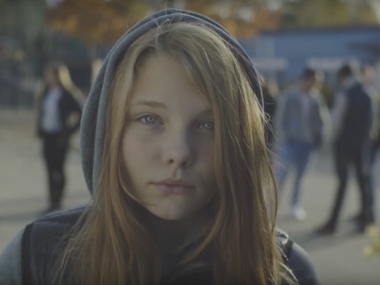Care Norway, a part of Care International, released a five-minute film from the point of view of an unborn girl child addressing her father in a letter titled, Dear Daddy. The video description on YouTube reads: 1 in 3 women worldwide will experience physical or sexual violence in their lifetime, usually from a male partner (WHO). Show that you never tolerate violence against women. [caption id=“attachment_2549548” align=“alignleft” width=“380”]  Screen from the video. YouTube[/caption] “Okay? I am not going to hurt any women, I know that. Why should I watch it,” you might ask. Well, here is why: The five-minute film is told from the perspective of a female foetus, yet to be born, yet to experience the world and yet she knows what lies in store for her, once born. “I need to ask you a favour, a warning about boys…” she says and explains how by the time she would turn 14, she would have been called a “w****, b****, c***” — because they think it is funny or they are saying it “for fun of course” and because these are things that “boys just do.” The daughter addresses her father and says that by the time she is 21, she will be raped by a boy she had known for a long time because he too grew up hearing those sexist jokes, he learnt that it was okay to be disrepectful to women. Probably because her father had laughed when he called these names for fun. She tells her ‘Dear Daddy’ how her ‘Mr. Perfect’ resorted to violence — once because he was stressed, another time because he was angry and then he kept doing it because it became easy, it became condoned, it became normal. The powerful video sends home a message: conversations and attitudes towards both genders shape human beings — man and woman. Some of the immediate criticisms that such videos usually receive are: ’they are preachy’ or the video misunderstands all men as abusers, rapists or wife-beaters; essentially that the message is reductive. However, there is a larger picture that the video is trying to paint (and succeeding for most part). It is being vehement in its support of men and reitirating that they are not the problem. The video is not hating on men or shaming them for being well… just men. Instead, the video beautifully highlights how behaviour that goes unchecked tends to get normalised. This normalised behaviour in turn breeds a culture that is sexist, encourages abuse or one that doesn’t find anything abnormal about abuse. For example, in the video when the girl is talking about her fiancé and how he starts by yelling at her and progresses to physically harm her. The girl’s voice is still trying to make excuses for the behaviour — “Am I over reacting?”, “I am way out of line”, “We are still the world’s greatest couple and I am so confused… I love him.” The message here resonates with domestic abuse survivors everywhere. Lettie L Lockhart, Fran S Danis in their book, Domestic Violence: Intersectionality and Culturally Competent Practice, say that one of the reasons that women (highly educated, strong individuals) still succumb to domestic violence is because women are socialised to believe that they are responsible for the emotional health of their families and relationships. They also blame themselves when something goes wrong. This stems from a long standing culture where women are consistently blamed for things that happen to them. Rape: It happened because you wore different clothes, you were drunk, you led him on. Divorce: You were not a good wife, you did not take care of his needs, you work too much. Single-hood: You are too independent, you don’t adjust, you are not good enough. Calling something that seeks to challenge the status quo of existing norms, beliefs and ideas about gender as “feminazi” or “man-hating” has become a popular criticism that lacks any depth. Communications director of Care, Henrik Vanik is quoted in The Local (Swedish version) as saying, “It is difficult to get men to discuss violence against women…” This video is trying to get men to be a part of the discussion. The video is not degrading men, it is encouraging men to look inwards and away from a culture that tells them that it is okay to act poorly. No one wants to fix men, we just want to fix the broken system that undermines and undervalues women. We need to recognise that actions have consequences — one thing leads to another. Watch the video here:
The five-minute film is told from the perspective of a female foetus, yet to be born, yet to experience the world and yet knows what lies in store for her, once born.
Advertisement
End of Article
Written by Vishnupriya Bhandaram
Cultural anthropologist with a terrific nose for news. Obscure music hound. Rarely bored — always scrolling, always reading. see more


)

)
)
)
)
)
)
)
)



